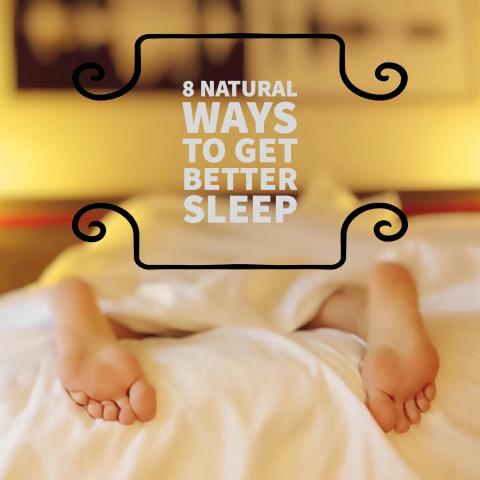 Sleep is a critical part of our wellness and it plays a major role in our lives. I mean, you do it everyday, don’t you? But sleep disorders are a serious problem that can cause a rather vicious cycle, especially for those experiencing chronic pain. It has been revealed that pain is the top contributor to sleep disorders. In turn, disrupted sleep contributes to pain conditions. See the cycle? Luckily, there are many things you can do get better sleep at night:
Sleep is a critical part of our wellness and it plays a major role in our lives. I mean, you do it everyday, don’t you? But sleep disorders are a serious problem that can cause a rather vicious cycle, especially for those experiencing chronic pain. It has been revealed that pain is the top contributor to sleep disorders. In turn, disrupted sleep contributes to pain conditions. See the cycle? Luckily, there are many things you can do get better sleep at night:
-
Stick to a schedule: Your biological clock thrives with consistency. Establishing a regular sleep schedule that has you wake up and go to bed at the same time everyday, all seven days of the week, improves your sleep immensely. Sticking to your body’s schedule optimizes the quality of your sleep, minimizes tossing and turning, and may even lead you to throw out your alarm clock!
-
Stay away from the toxins: Stimulants, in all their forms, should be avoided if you’re concerned about your sleep routine. Nicotine and caffeine are only a couple of the widely used stimulants today. Smokers are approximately 4 times more likely to report not feeling well rested from a night’s sleep versus non-smokers. And caffeine, from all its sources, stays in your system approximately 8 hours. So you may want to consider quitting cigarettes and eliminating coffee after noon. Rewarding restful sleep may be worth the effort that it takes to make these changes.
-
Journal: Does your mind keep you up? It’s hard to shut it off, isn’t it? If you can relate, write it out. Dedicate a journal to your worries or the thoughts you don’t want to lose. Once it is on paper you allow the thought to leave your mind and you can save it for tomorrow if you need to spend more time thinking about it or not.
-
Breath Deep: Meditation can be a scary suggestion to some people because quite frankly, it is harder than it seems without building a practice (which I do absolutely recommend by the way). But just focusing on taking deep breaths relaxes your body, reduces your heart rate, and releases endorphins. Try the 4-7-8 breath: Inhale through your nose for a count of 4, comfortably hold it for 7, and exhale deeply through your mouth for a count of 8. You will be able to feel your body relax!
-
Turn off the lights: Light exposure is a crucial component to getting quality sleep. Melatonin is a hormone that makes us sleepy and it is regulated by our exposure to light. Therefore, less light, more melatonin and better sleep! The blue light produced by your television, phone, or computer is especially disruptive, but even a night-light or a streetlight peeking through your blinds can trick your brain into thinking that it’s time to be awake. Ideally, the best light for sound slumber is none at all.
-
Smell your way to sleep: Whether it be a spray bottle or a diffuser for essential oils, the sense of smell is a very powerful tool for your health and sleep. Scents such a lavender, eucalyptus, and chamomile are only a few that aid in your brain’s process of relaxing. Spray some scents on your pillow or burn essential oils in your bedroom. Either way is a step forward in improving your sleep (and making your home smell great).
-
Mask the sound: It is difficult to fall into a deep sleep with noise in the background. Some people claim to sleep better with the television on, for example. However, studies have shown when sleeping with significant noise, whether it be your tv, kids downstairs, or your dog begging for attention, it is much harder to get into a deep sleep cycle. Instead, it is recommended to utilize white noise. White noise is an excellent way to mask other unwanted noises, while creating a more relaxing sleep environment.
-
Stay cool: It is often recommended to take a warm shower or bath before bed (and I agree). However, it is not just to relax your body, but also to help regulate your temperature. Once you get out of that warm bath, your body temperature drops leaving you colder than before your bath. Jumping right into bed, dressed in cool sheets, prepares your body for restful sleep. While everyone is different, research suggests that maintaining a room temperature between 65° and 75°F is ideal for restful sleep.
Sleep tight!
Sources for this post:
- http://www.prevention.com/health/sleep-energy/20-ways-to-sleep-better-every-night/slide/21
- http://www.helpguide.org/articles/sleep/how-to-sleep-better.htm
- https://authoritynutrition.com/17-tips-to-sleep-better/
You can check out our articles and infographics to learn a multitude of ways to start relieving your pain naturally!
At Real Time Pain Relief, we not only care about the quality ingredients that go into each and every one of our products – but also about the people who buy them. We hope this blog, and the articles posted on it, become a valued resource for your own personal journey to better health. We know natural products that reduce your pain at the source are important to you, and for more than 17 years, our Real Time Pain Relief rub-on has been providing fast acting, targeted pain relief with natural ingredients to thousands of satisfied customers. From the useful information on this blog to our high-quality natural products, we hope you become one of the thousands of customers telling us they “Enjoy Living Again!”
- Log in to post comments

